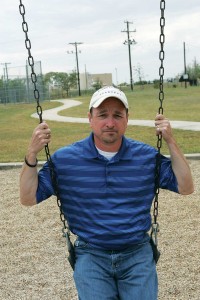The air samples collected by ShaleTest were analyzed by Columbia Analytic Services (now ALS Environmental) of Houston. The DISH location and Delga Park, both near compressor stations, had the highest levels of benzene and xylene.
“I don’t think parks and playgrounds should be anywhere near gas wells,” Tillman said, “but things like gas processing facilities and compressor stations certainly should not be around parks.”
Gas company spokespersons declined to comment on this story because they had not seen the report.
Ruggiero predicted that the drilling industry would eventually try to discredit the ShaleTest findings.

“They’re going to say this was not done correctly. They’re going to say they don’t trust our methodology, that all we took was a snapshot and not a long-term view, that their workers aren’t getting sick,” he said. “But you know what? Their workers can go home at the end of the day. The people who live around these parks — well, some of them have pre-school kids who are living with those chemicals all day, every day, for years. Those people can’t just get out of exposure to those chemicals after eight hours.”
What’s most disappointing, Ruggiero said, is that “after all these years we’re still asking the same questions and fighting the same battles we have been fighting from day one. If these gas companies want to be good neighbors, they should be testing their own sites and remediating them. They should be responsible for their equipment. Compressors don’t have to leak. Water separators and gas wells don’t have to leak. They don’t have to poison people to get the job done, but they do.”
Kwiatkowski said it bothers her that people like Ruggiero and Tillman are having to do the studies. “They’re stuck … because the government isn’t doing them, and the gas companies certainly are not doing them. The industry is not in any hurry to put monitors on their vents to tell us what is actually coming out into the air we breathe.”
She said that the gas industry’s position is that no one can prove that the dangerous chemicals are coming from their equipment. “But the response to that should be, ‘Well then you tell us what you’re emitting. You do the tests. Do the work to get us that information.’ But they won’t do that. They don’t want to be found responsible for people getting sick.”
TCEQ spokesperson Andrea Morrow, in an e-mail response, said the commission could not “comment on the validity of the data [in the ShaleTest report] or determine if the data were evaluated appropriately.”
The ShaleTest samples were “representative of a short-term exposure duration. It is not scientifically appropriate to compare short-term measurements to TCEQ long-term air- monitoring comparison values,” she said. “There is not enough information in this report to suggest that there is a reason for concern.”
Tillman argues that when short-term “snapshots” show the same results year after year, they do paint a bigger picture.
“I do not believe that TCEQ even has a seat at the table in this discussion, given their history of siding with the gas industry,” he said. “We’ve been collecting data for 10 years or so, and we have a bunch of snapshots in time, and they all suggest there is a bigger problem here.”
Alan Septoff, communications director for Earthworks, a nonprofit dedicated to protecting communities from the adverse impacts of mineral and energy development, agreed with Tillman’s assessment of TCEQ. “Rather than take the results … as a warning flag that demands follow-up to determine if a long-term problem exists, they try to minimize the problem” he said.
********
Jane Lynn is an anti-drilling activist from Arlington. When she spoke to Fort Worth Weekly, she’d just gotten off the phone with the Mansfield gas well inspector.
“I have a teenage daughter in her school’s marching band, and when they go to different schools and fields, she’s exposed to all of this stuff. They’re marching for hours in that gas well air, and it concerns me, and it should concern any parent,” she said. “It’s a shame that I have to even consider that my daughter might be stuck in a place for hours and hours while she breathes poisoned air.”
Lynn doesn’t think there should be any gas activity near parks. “It should not be around people, period. But it is,” she said. “These gas companies discovered the minerals here, and that made us people just something in the way. … We’re a nuisance to them. And they drilled, and it has been reckless, and it should be a human rights violation. Heck, we’re not even humans to the gas companies — we’re a track number on a piece of property.”
She said she’d like to have ShaleTest taking samples in Arlington. “We need them here testing our playgrounds. We can’t afford not to know if our kids are safe.”
Many children live in the immediate area of the parks tested by ShaleTest. In DISH, the study said, 49 kids live right near the playground. The neighborhood surrounding Delga Park is home to 378 kids. Near McKenna Park in Denton, the number is 735.
“When we say ‘the immediate area,’ we mean within a few blocks at most, and we used census data to ascertain the number of children living there,” Tillman said.
Wilma Subra, an environmental scientist and former vice-chair of a national advisory council for the Environmental Prodection Agency, called the ShaleTest report significant.
“We have a problem here,” she said. “Let’s face it: This is a long-term exposure issue to a known carcinogen. And the kids probably also live near those parks. So we’re looking at a cumulative impact of where they play and live and go to church — and that’s bad.”
“The gas companies have told us since the beginning that the chemicals they’re spewing from wells, from fracking, from every facet of the industry do not exceed long-term danger levels,” said Tillman. “But we’ve been into this for more than a decade now, and all the samples we took are right next to playgrounds.
“Maybe the levels we’re seeing — excluding benzene levels — won’t harm adults,” he said. “But it’s our babies, our children who are exposed to these poisons, and we’re getting to a point where we will be seeing real and bad health effects. How can you put these levels of carcinogens in playgrounds and hope kids won’t be affected? We are going to get what we know is coming, and that’s a shame.”
Tillman said he hopes the results of Project Playground will prompt local governments to have their parks and playgrounds tested as well.
“We’d like to see air sampling done all over the country where gas and oil work is being done,” he said. “Heck, we did only a fraction of the playgrounds that are near gas facilities in North Texas. There are lots of them, and they’re all over, and they are hurting a lot of kids. And that should not be happening.”











TCEQ and critics will likely dispute this study – When they do – feel free to post their own investigation conducted at the same Mansfield location where they did detect Benzine, Toluene, Ethylebenzene, Chloroform and a long list of other toxins – Download the TCEQ Huston report here – http://mansfieldgaswellawareness.weebly.com/documentation .. ( tceq_violation_huston_1134156.pdf ) and the FLIR from this investigation is on the home page. This was during school hours and my son was in the Daycare/Playground that day 900 ft down wind from the event .
My husband’s co-worker and his family live in the neighborhood beside Delga Park. He has 2 or 3 small children. His young wife was recently diagnosed with Leukemia.
Great read, Peter. Thank you for your dedication to our communities.
The UTA Air monitor is getting benzene spikes too above the long term exposure threshold, but ANY amount of Benzene is unhealthy…
http://barnettshalehell.wordpress.com/2012/11/01/benzene-over-5-times-background-utarlington-air-monitor-last-night/
The FORT WORTH WEEKLY is a local left-leaning free tabloid. It has published anti-fracking articles for as long as natural gas drillers have been fracking for gas in Texas. In its most recent issue, writer Peter Gorman condemns the natural gas industry for creating toxicity at Fort Worth’s Delga Park. https://www.fwweekly.com/2014/10/01/bad-air-day/.
Gorman’s article is replete with jargon about acceptable readings for benzene, xylene, toluene, and the like. This is so over my head that I won’t endeavor to challenge it. But Gorman went further: He said that after 30 minutes in Delga Park, he felt searing in his throat. After an hour, his eyes watered. In two hours, breathing was difficult even though he was sedentary, and he had to leave.
I doubted his story. Look: There are folks who oppose the harvesting of fossil fuels AT ALL, and I think Fort Worth Weekly is in that crowd. You publish a tabloid which regularly condemns fracking; then you publish an article where the writer says a gas well caused his shortness of breath; and I’m going to question his agenda.
So this morning, armed with a croissant, coffee, and the Sunday crossword, I went to Delga Park to replicate Gorman’s experience. The place does have a distinctive smell. But so do my feet, and it doesn’t make them deadly. After 30 minutes, my only sensation was that the croissant and coffee had done their work and I looked around for a portapotty. Bored with the puzzle, I began walking around the park. I walked through the ball field, then to the natural-gas plant so I get a selfie of me and a pipeline-warning sign. Every now and then I sat to work on the puzzle, but the majority of my two hours at Delga Park was spent walking.
I found out what I wanted to know. In Gorman’s two hours there, he claims he experienced a burning throat; watery eyes; and shortness of breath without physical exertion. I’m on the downhill side of 60, and I experienced none of this. Gorman is either a liar or a wuss.
I recommend you walk there everyday for at least two hours. That is the best way to counter this story.
So based on your individual experience, you’re okay with this toxic emissions plant right next to homes and a playground? What may also be ‘over your head’, in addition to the actual testing results, is that everyone has different tolerances and chemical sensitivities. Also, many of the emissions have no odors. That’s why the FLIR footage is important, to show these emissions that are not visible with the naked eye-and some the nose.
You are correct on so many levels. This newspaper is against drilling and oil and gas production but they continue to drive vehicles, heat their homes and offices with natural gas, and use electricity derived from coal (I’d bet good money on it)
The saving grace is that very few read this publication. Same as radio – liberal radio shows, TV shows and print publications fare far worse than their conservative counterparts.
Wait…you actually think it would be a good thing if very few people read a publication with award-winning investigative features and edited by a Pulitzer Prize winner?
Be gone, troll.
Ruggiero: Natural gas is potentially lethal and we know going in that there are inherent risks with it. Indeed, there are risks inherent with almost all forms of energy. I do not favor banning gas plants that are “right next to homes and a playground” merely because there’s SOME level of toxicity. If we were to take such a zero-tolerance approach, we would end up banning many quite useful things.
There should be objective standards for energy producers, and citizens should insist that regulators hold energy producers to them. But that’s the part of Gorman’s article that I did not challenge because I can’t. His scientific data will stand or fall on its own.
The point is that Gorman should have stuck to such data and avoided the dramatics of him leaving the park gasping for breath. His article declaimed the park’s hazards to children and pregnant women, but the best example he could cite was shortness of breath by a 60ish man who smokes? (See Gorman’s website photos).
I think you miss the point. There are less than a dozen families living in nice little houses that abut the park. One woman can no longer work because of constant rashes and nausea that started after the compressor stations came in. One woman has leukemia, which occurred after the compressor stations came in. One woman has a child who is losing his hair, a condition that began after the compressor stations came in. All of these conditions occur with exposure to the chemicals found in the “air grabs”. That’s three out of 10-11. Is that acceptable to you, or anyone? Is is acceptable when you can fix it so that there is no gas escaping at nearly no cost? Is it acceptable if you were a shareholder or a lease owner to know that 25 percent of the gas coming from the wells is escaping into the air, poisoning people and costing you 25 percent of your royalty? I don’t know. I don’t think, like either you or the person who posted prior to you, that anyone at the FW Weekly is against energy. I think that everyone who knows the score is against bad business practices that hurt people/sometimes kill people. Of course the gas industry resists change that would fix the problems: Most of us resist change because we’re comfortable with the way we do things and change suggests that we’ll have to, well, change….and that is not attractive. It’s downright scary. But it is very doable. It doesn’t cost a lot of money, just a small infusion that quickly pays for itself and subsequently makes a profit for everyone and prevents more leukemia/hair falling out/rash problems and so forth. And yes, I drive a car: A Ranger, actually, and I heat my house with electricity which is possibly powered by coal or gas or oil. The problem isn’t always the product, the problem is sometimes the hands in which the product lies. If the gas companies wanted to be good neighbors, gas drilling would quickly disappear from our pages–which are actually read by tens of thousand of people and make changes in places like New York, which banned drilling because of our stories, among others. But if energy companies insist on doing the shoddiest work, cutting corners, ignoring and then denying illnesses they cause, well, as good citizens, we’ll probably keep calling them out on it.
And yes, I’m a 63-year-old cigarette smoker. I still walk several miles a day, take four groups a year out into the deep Amazon jungle and can certainly out push-up most men my age. And no, I’m not a liar regarding what happened that day in Delga Park. Which leaves me, I guess, just a wuss. Darn it!
These gas-driller apologists missed your point, Mr. Gorman. The Startle-Gram hacks and tea- bagging nit-wits go into their act every week on the Weekly’s pages. Don’t you know their mamas are proud of them? They’re the heroes who gave us Dick Cheney & the Bushes and helped shut down our country’s economy, so that our our nation could neither pay it’s bills nor fulfill it’s promises. To answer my own query – yes, their tea-bagger mamas ARE proud of them!
Texans don’t give a shit whether the natural gas business is endangering Texans.
Have you seen all the oil and gas wells in our neighborhoods? Texans, being predominately white Republicans, love ‘big bidness’ like gas and oil. They care about their drilling jobs and their gas royalties. The all mighty dollar rules conservatives. They hate the EPA. They treat environmentalism as if it were spawned by a Kenyan Islamo-terrorist with bad acne and a crack habit.
And as far as protecting Texas children is concerned, Texans do not care enough about their children to teach them REAL science and REAL history. They would rather indoctrinate their children in religious fairy tale nonsense or revisionist, right wing claptrap like “American Exceptionalism.’
There is a very good reason why big oil and big business loves Texas, but we are too intoxicated by the green of money to give a shit about any other type of ‘green.’